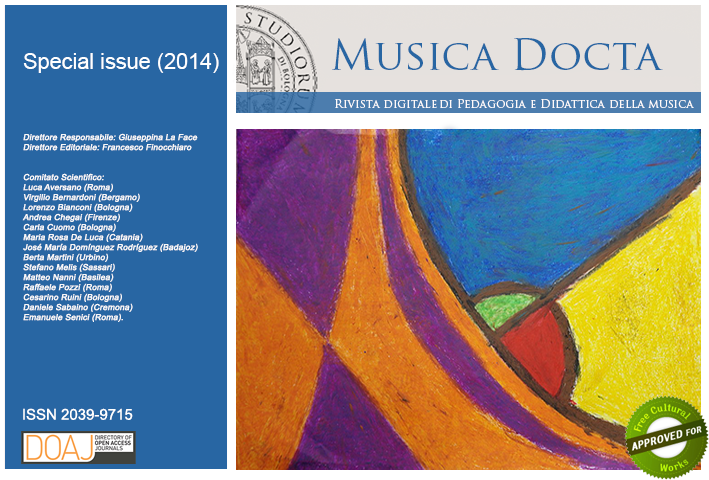Composing difference: The idea of ‘society’ in the teaching of musical composition
DOI:
https://doi.org/10.6092/issn.2039-9715/4310Abstract
The aspiration to a universal art, especially to a universal music, is problematic in so far as both are viewed as oases of protection and conservation of quintessential cultural singularities. The cosmopolitan universalism of the Enlightenment, first, and subsequently the exacerbated nationalisms of the 19th century, have deeply affected European culture, down to specific aspects of music education. Undoubtedly, today it would be impossible to teach students to compose in the German, French or Italian style, although it still made sense until the end of World War II. What can, and should, be done instead, is to extrapolate and highlight the salient features of "European musical knowledge”. This knowledge was, and remains, coherent and uniform in its basic linguistic structures, despite any forced emphasis placed on internal differentiations and local articulations.
Downloads
Pubblicato
Come citare
Fascicolo
Sezione
Licenza
Copyright (c) 2014 Giovanni Guanti
I diritti d'autore di tutti i testi nella rivista appartengono ai rispettivi autori senza restrizioni.
La rivista è rilasciata sotto una licenza Creative Commons Attribuzione Condividi allo stesso modo 4.0 Internazionale (codice legale completo).
Vedere inoltre la nostra Open Access Policy.
Metadati
Tutti i metadati dei materiali pubblicati sono rilasciati in pubblico dominio e possono essere utilizzati da ognuno per qualsiasi scopo. Questi includono i riferimenti bibliografici.
I metadati – riferimenti bibliografici inclusi – possono essere riutilizzati in qualsiasi formato senza ulteriori autorizzazioni, incluso per scopo di lucro. Chiediamo cortesemente agli utenti di includere un collegamento ai metadati originali.






